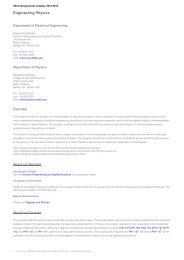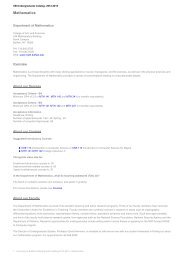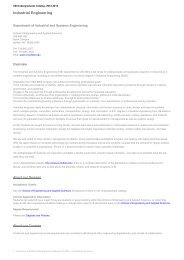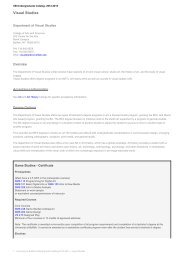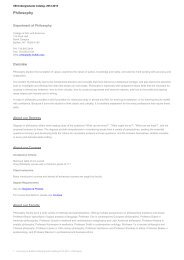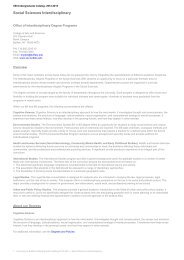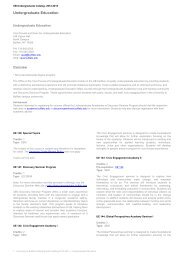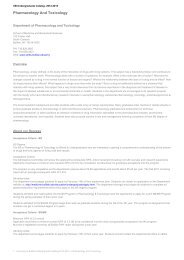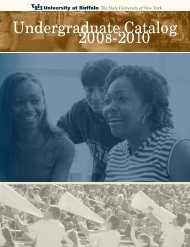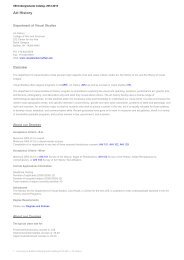Undergraduate Catalog â Print Version (PDF: 4.66MB)
Undergraduate Catalog â Print Version (PDF: 4.66MB)
Undergraduate Catalog â Print Version (PDF: 4.66MB)
- No tags were found...
You also want an ePaper? Increase the reach of your titles
YUMPU automatically turns print PDFs into web optimized ePapers that Google loves.
Computer and Network Acceptable Use PoliciesAll students are expected to comply with the computing and acceptable usepolicies found at the IT Policies Web site: http://www.itpolicies.buffalo.edu. Penalties for non-compliance include loss of access to your UB ITaccount and to UB IT resources.Copyright Infringement and Illegal Downloading PoliciesThe distribution of copyrighted material from your computer, includingmusic, games, and videos, for which you do not have the copyright owner’spermission is a violation of federal law (DMCA) and university policy.Copyright owners frequently hire agents to scan university networks forcopyrighted materials that are available to others from computer systemson the network. UB receives many notices from these organizations allegingcopyright infringement. If you download and/or distribute unauthorizedcopies of copyrighted music recordings and movies, you are breakingthe law and may be held legally liable for thousands of dollars in damages.Please read UB’s policy on illegal downloading and file sharing athttp://www.itpolicies.buffalo.edu/dmca/.Official University Communications and Required Use ofUB E-mail AccountsMany official university communications to students are sent to theirpermanent addresses or university e-mail addresses. Students are responsiblefor ensuring that their permanent addresses and e-mail addresses arekept up to date in the university’s student information systems and thatthey regularly read their e-mail sent to their university @buffalo.edu e-mailaccount.Policies Governing NondiscriminationThe following university policy statements are reissued in accordance withthe requirements of various federal and state laws and regulations.General PolicyNo person, in whatever relationship with the State University of New Yorkat Buffalo, shall be subject to discrimination on the basis of age, creed,color, handicap, national origin, race, religion, gender, sexual orientation, ormarital or veteran status.Sexual HarassmentSexual harassment of employees and students, as defined below, iscontrary to university policy and is a violation of federal and state lawsand regulations.Unwelcome sexual advances, requests for sexual favors, and other verbalor physical conduct of a sexual nature constitute sexual harassment when:(1) submission to such conduct is made either explicitly or implicitly a termor condition of an individual’s employment or academic advancement;(2) submission to or rejection of such conduct by an individual is used asthe basis for employment or academic decisions affecting such individual;(3) such conduct has the purpose or effect of unreasonably interfering withan individual’s work or academic performance, or creating an intimidating,hostile, or offensive environment.No university employee of either gender shall impose a requirement ofsexual cooperation as a condition of employment or academic advancement,or in any way contribute to or support unwelcome physical or verbalsexual behavior.Any member of the university community who requires additionalinformation or who wishes to make a complaint or receive a copy of theuniversity procedures to be followed for complaints arising from mattersrelated to the policies outlined above should contact the Office of Equity,Diversity, and Affirmative Action Administration, 406 Capen Hall,(716) 645-2266.Academic Grievance Policy and Proceduresfor <strong>Undergraduate</strong> StudentsIt is an objective of the University at Buffalo to encourage the promptconsultative resolution of grievances of undergraduate students as theyarise, and to provide orderly procedures for the formal consideration andresolution of complaints that cannot be resolved through consultation.This set of procedures is designed to provide a well-defined, yet appropriatelyflexible structure that recognizes and reflects the issues unique toundergraduate education as well as academic areas common to all facultystudentor administrator-student relationships.The following procedures provide a sequence of steps for the orderlyand expeditious resolution of grievances initiated by undergraduate students.While recognizing and affirming the established principle that academicjudgments and determinations are to be reached solely by academicprofessionals, it is the University’s intention to secure, to the maximumextent feasible, equitable treatment of every party to a dispute. To that end,those who oversee the grievance process are charged to pay heed not onlyto issues of procedural integrity, but also to considerations of substantivefairness.Grievance Definitions and LimitsDefinition. A grievance shall include, but is not restricted to, a complaintby an undergraduate student:• that he or she has been subjected to a violation, misinterpretation, orinequitable application of any of the regulations of the university, collegeor school, or department; or• that he or she has been treated unfairly or inequitably by reason of anyact or condition that is contrary to established policy or practice governingor affecting undergraduate students at the University at Buffalo.Time Limit. A grievance must be filed within one calendar year from thedate of the alleged offense. The cognizant department chair, college orschool dean, or the Vice Provost of <strong>Undergraduate</strong> Education may extendthis time limit upon demonstration of good cause.Consultative ResolutionVirtually all disputes originate in the department or comparable administrativeunit and should, if feasible, be resolved through consultation betweenthe disputants. The parties should meet and exert a good faith effort toresolve the dispute amicably.At the request of either or both parties, the consultation may berecorded by a departmental note-taker (a staff or faculty member, but nota student). If a departmental note-taker is present during the consultation,the student may have an additional note-taker of his/her choosing also inattendance. Neither note-taker may actively participate in the consultationbetween the parties to the grievance other than to request repetition orclarification of statements made by either party during the consultationsession.It may be useful for the student to seek first the assistance of a studentadvocate (available through the Office of Judicial Affairs), his or heradvisor, department chair, or director of undergraduate studies acting as amediator to aid in evenhandedly resolving the dispute.Formal ResolutionI. Departmental Level ReviewStep 1The student who believes that the grievance is severe or has been unable toobtain an acceptable consultative resolution should submit in writing to thecognizant department chair a description of his or her complaint, includingany evidentiary or supporting materials, and a request for a hearing. (If thedepartment chair is a party against whom the grievance is brought, eitheras a teaching faculty member or as chair, or where the chair can demonstratethat it will best serve the interests of the parties, direct petition to theschool or college level may be pursued.)Step 2The cognizant department chair shall give the Department GrievanceCommittee and each principal a copy of the written grievance, includingany evidentiary or supporting materials, and a copy of the Academic GrievancePolicy and Procedures for undergraduate students.Upon initial review of the materials and statements presented by thegrievant, if the Department Grievance Committee finds the grievance doesUniversity at Buffalo • <strong>Undergraduate</strong> <strong>Catalog</strong> 2007-08 27ACADEMIC POLICIES AND PROCEDURES



